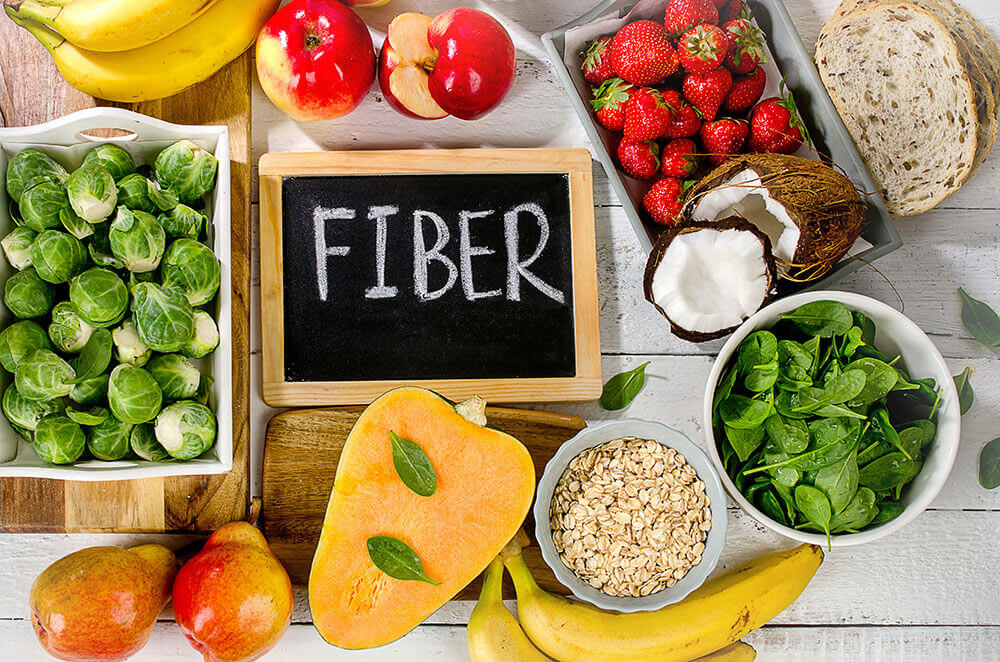
Consuming plenty of foods that are high in fiber can help relieve hemorrhoid symptoms. The NIDDK (National Institute of Diabetes and Digestive and Kidney Diseases) estimates about one in 20 people in the US experience hemorrhoids. About half of the adults who are over 50 will have to deal with hemorrhoids at some time. Whether you want to try to prevent hemorrhoids, or are treating them, eating high fiber foods can make a difference.
How can changing your diet help with hemorrhoid symptoms?
For many people, eating more low fat, high fiber, and whole-grain foods helps prevent symptoms of hemorrhoids. Eating more fiber can provide several benefits including:
- Increasing stool weight helps reduce the time it spends in the colon
- Fiber increases water retention in the colon which results in softer stools that are easier to pass
- It also decreases the pH levels in the colon which helps pass foods through the colon more quickly
How much fiber do you need? Check with your primary care physician or a nutritionist to be sure you are getting adequate amounts. Most people need 14 grams of fiber for every 1000 calories consumed daily.
What are the best food choices to prevent or treat hemorrhoids and their symptoms?
There are a lot of foods that are higher in fiber. Some of the best choices for helping lessen or prevent hemorrhoid symptoms include:
Whole Grain Foods with Fiber
If you do not have a sensitivity to gluten, wheat bran and shredded wheat provide quite a bit of fiber. Many people are unaware of the benefits of barley. It is rich in a specific fiber called B-glucan. Once it reaches the colon, it breaks down to form a gel that helps soften the stool. Barley is known to help with colon health. Choose whole-grain or whole wheat pasta, bread, and cereal for a source of insoluble fiber. Whole wheat products with nuts and seeds offer even more beneficial fiber and nutritional value.
Fruits with Lots of Fiber and Other Health Benefits
Prunes and prune juice have long been touted as a natural remedy for constipation. Just half a cup contains almost 4 grams of fiber. Prunes also contain phenols that are helpful to the gastrointestinal system and help reduce the risk of infection. Pears are very high in fiber too. Eating a pear with its skin on may offer as much as six grams of fiber. This fruit also contains fructose, a natural laxative. Berries offer a lot of fiber per serving because of their high skin-to-flesh ratio. One 100g serving offers nearly 6.5g of fiber. A medium-sized apple with the skin offers almost 4.5g of fiber. The skin also contains insoluble fiber, meaning it doesn’t break down during digestion. That helps bulk up the stool and has a slight laxative effect.
Vegetables that Are Good for Your Colon
A cup of corn offers over four grams of fiber. In ancient times, corn was used as a cure for hemorrhoids. Maybe it’s because it was seen as an effective cure because of its fiber content. But corn also contains strong antioxidants. These help prevent free radicals from causing cellular damage. Both potatoes and sweet potatoes offer decent amounts of fiber. Remember to eat the skin too. If you haven’t tried artichokes, they may be worth it as one medium artichoke has over 10g of fiber. Broccoli offers lots of fiber and sulforaphane which is a compound that helps protect the gut and improve digestion.
Beans and Legumes
Most types of beans and legumes have lots of fiber. Try adding more beans and legumes into your diet to reap the benefit of the additional fiber they can provide.
Are there any foods to avoid if you have hemorrhoids?
Foods that are highly processed, rich in sugar, fats, or refined carbohydrates can increase constipation and the risk of hemorrhoids. To help reduce your risk of both constipation and hemorrhoids consider avoiding foods like:
- Salty, fried foods
- Packaged snacks like chips
- Full-fat dairy foods
- Heavily processed food
- Red meat
- Chocolate and candy
- Soda, sports and energy drinks
- Alcohol
- Too much caffeine
Know When to Call a Specialist
For many people, managing constipation or diarrhea can help prevent hemorrhoids from developing. If you have frequent bouts with diarrhea or constipation, you may be at risk for many other serious health conditions too. Contact us at Pinnacle GI Specialists to discuss your situation. Let us demonstrate the power of compassionate care.


